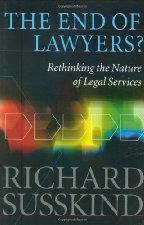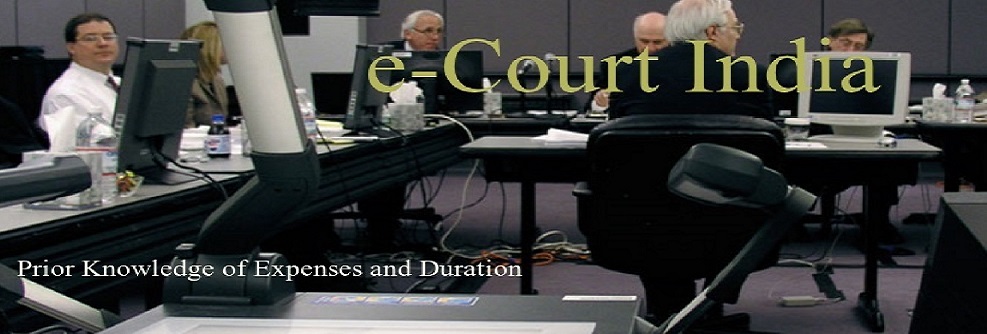"e-Court will re-shape the future of Indian litigation - Forces transforming the legal industry promise the emergence of new models that will allow clients to reap huge efficiencies, but at the expense of law firms that fail to adapt"
India experiences, in common with most western democracies, an increasingly complicated society. It is, therefore, no surprise that the legal system across the country gets clogged up, especially where it regards civil and common law areas. The waiting time for trial can be anywhere from six months to three years or longer. Suggested reading: The Litigation Process
Even Small Claims Courts in India which provide a resolution for simple cases will take you the better part of a year to go through the entire Small Claims Court process i.e. have your trial and get judgement. Collecting adds further delay and is an entirely different story, it is by no means the easiest undertaking both in terms of additional expense and duration.Apart from the unacceptable time it takes to find judgement in regular government courts, the actual litigation process also adds a mystique for many people and makes the entire process through the traditional courts a very frustrating and intimidating experience to the layperson.Click for video - The need for e-Court.
In recognition to above, e-Court has been introduced to provide competent, affordable, simple, speedy and transparent justice for everyone. e-Court also provides a uniform litigation system throughout India without the need to understand the peculiarities existing in each state legislative system. We encourage you to read about e-Court in the following pages. You shall not be disappointed. Join e-Court with the knowledge that legal justice is rendered with prior knowledge of expense and duration. It is expected that e-Court during its first six months of operations is capable of handling a minimum of #2,000 cases at any one time, with at least #100,000 cases at full maturity.

Please Click The End of Lawyers? Rethinking the Nature of Legal Services by Richard Susskind OBE and Are Lawyers doomed ?
A few quotes from readers :
"Challenging book about how legal services will be produced and delivered in the future."
"Brilliant ideas, new ways for legal professionals (my clients) to do and sell their work. Gives a good overview what technology has to offer in the future, also affecting the legal translators market."
"Makes a good case that lawyers must either innovate or face increasing risk of becoming obsolete."
"For me, this is a reference book. It helps me deliver high value to my clients."
"Richard sets a new challenge for all lawyers. He urges them to ask themselves what elements of their current workload could be undertaken more quickly, more cheaply, more efficiently, or to a higher quality using different and new methods of working. He argues that the market is unlikely to tolerate expensive lawyers for tasks that can be better discharged with support of modern systems and techniques. He claims that the legal profession will be driven by two forces in the coming decade: by a market pull towards the commoditisation of legal services, and by the pervasive development and uptake of new and disruptive legal technologies. The threat here for lawyers is clear - their jobs may well be eroded or even displaced. At the same time, for entrepreneurial lawyers, Susskind foresees quite different law jobs emerging which may be highly rewarding, even if very different from those of today"
"Susskind wrote a book in 1996 predicting changes in the legal sector. Most people disagreed and said he was an idiot. (He's Emeritus Prof of Law at Gresham College London and holds a doctorate in law from Balliol College Oxford...he's no idiot) Most (if not all) came to pass. He's now done it again and still people pooh pooh his predictions. Not me.
A good book but a hard read unless you're really, REALLY interested but if you're a lawyer, you absolutely must read this book."
"We live in a constantly changing world - and even arch-conservative lawyers need to adapt. Susskind is well informed and dares to predict future events based on current patterns within law firms and client companies, combined with the advancement of technical support. That does perhaps not sound very fascinating, but any lawyer not intent on retiring within the next couple of years ought to read it..."
"Maybe not quite an apocalypse but definitely unavoidable change. Interesting to hear an independent voice confirming some of my own observations in the patent attorney business."
"A very thought provoking book that challenges the relevancy of lawyers in a changing, complex business environment. "
"This book resonates with the modern thinking around the neccessity of transformation and outsourcing in the legal profession and asks the relevant questions about the way the profession is being run today."
"I highly recommend this book to all lawyers. It is incredibly insightful as to where our profession is going. It is fascinating to read (and I believe he is correct personally) when he argues that the practice of law is going from "bespoken" (face to face) to "commoditized" (a prepackaged produce that is sold with little one on one contact between the lawyer and client). "
"Seems solid. Even over my 12 years in the business of law, or at least something related to it such as patent licensing, the legal profession has changed greatly. The time of the narrow minded risk averse wimp attorney is ending."
"The End of Lawyers" is a very serious analysis of the nature of legal services and how those services can best add value to clients and the public in the 21st Century. The book recognizes that the future is more than simply the automation of past processes, but evolution of those processes themselves into a different paradigm. A must-read for those who use or deliver legal services today."
"A compelling read. The meta-theme of the book--that lawyers are avoiding using technology because it foreshadows commodification of their services--is right on the money. Plenty to think about here."
"Very interesting book. The realt threat to lawyers isn't so much the Legal Services Act but the creation of fundamentally new ways of working with IT. "
"I have read this book. Very interesting read . If a fraction of what the author suggests may happen in the next few years in the legal profession we can expect massive changes in the industry. Would suggest all lawyers should read this book."
"Detailed, scholarly analysis of the Legal Profession. Author identifies 2 major sources of change in the practice of law----Information Technology and Commoditization of services. Author acknowledges that, so far, many lawyers and their policy makers have been slow to work with or promote these trends. He also says that clients are the major players in pushing lawyers in new directions. See article in WSJ, today, August 24th, "'Billable Hour' Under Attack, ...Companies Push Law Firms for Flat-Fee Contracts". The billable hour has been under attack for 20 years, but has not receded much until this year. Because of the recession, clients are putting their foot down."
*"Information Technology is changing the future of Lawyer's services. This book shares both the specific IT impact and what from IT we will rely on to make legal decisions and judgements of truth. The book also indicates the degree to which the Lawyer's will need to change what and how they operate."
"Interesting book about the future of legal services. The concepts seem equally as applicable to many other professions. The high level concept is that more and more people are going to turn to technology to complete the more repetitive tasks in a lawyer's day and leave only the most customized work to the humans. The author predicts that even when humans are doing the work technology will make that work more efficient and that may render the "billable hour" obsolete as a profitable billing tool. I agree with a lot of what he is predicting because much of it is already happening."
"A provocative title which amounts to a call to arms or more accurately a call to reflect and learn from what is changing and challenging everyone else's business model. If you have read his earlier offerings the themes are familiar but more compelling in the sense that the promise/threats/opportunities presented by ICT are now capable of presenting a much more fundamental threat to the way we practice and the underlying assumptions upon which the legal 'business model' is built. Equally clearly the threat ICT represents presents just as much of an opportunity if the incumbents are prepared to embrace them and understand the other changes transforming the market for legal services.I suggest reading this in conjunction with Christensen's 'The Innovator's Solution' Harvard Business School Press in order to appreciate how such threats have and can be utilised to advantage."
"An insightful look at the future of the practice of law. Check out the book review we did in the April issue of VistaLaw Views, which is posted and available for a free download free download
"As a Professional Legal Technologist, it is critical to stay current with our industry technologies and trends. Susskind did a fine job with his sequel by laying out where legal technology was, is and where we are heading.
Most interesting part was reading about these nine primary disruptive legal technologies that are changing the way lawyers deliver legal services.
* document assembly
* relentless connectivity
* electronic market place
* elearning
* online legal advice
* legal open-sourcing
* closed legal communities
* workflow and project managment systems
* embedded legal knowledge"
This book addresses some of the very issues that have arisen in the midst of the current meltdown in BigLaw, including the trend towards commoditization of legal services. It focuses our attention on the need to deliver value when providing legal services and discusses various models for doing so."
"A hugely insightful text on the new dawn of legal service provision. Crammed with thought provoking observations on existing IT innovations and predictions for the future role of IT in legal service provision. Any lawyer not planning on retiring from the law in the next 5 years should be aware of this thinking and the sorts of radical changes and forces described which are fast bearing down on the profession."
"Our profession is likely to go through significant change in the next 5 years, accelerated by the economic downturn and the prospect of third party investment in law firms, and I am keen to understand how we can use technology to deliver better client service and grow our business. "
"Susskind makes some extremely interesting predictions, based on solid research, on how he thinks the legal services sector, and in particular law firms, will evolve over the next 10 years. My guess is that conservative law firms may well be overtaken by third parties who will offer a number of services that will end up disintermediating many of the services currently offered by Big Law."
"This book is required reading for those thinking about the future of the legal profession. It is a roadmap to the impact on the Internet on the structure and nature of the legal profession."
...........AND SO ON.
















